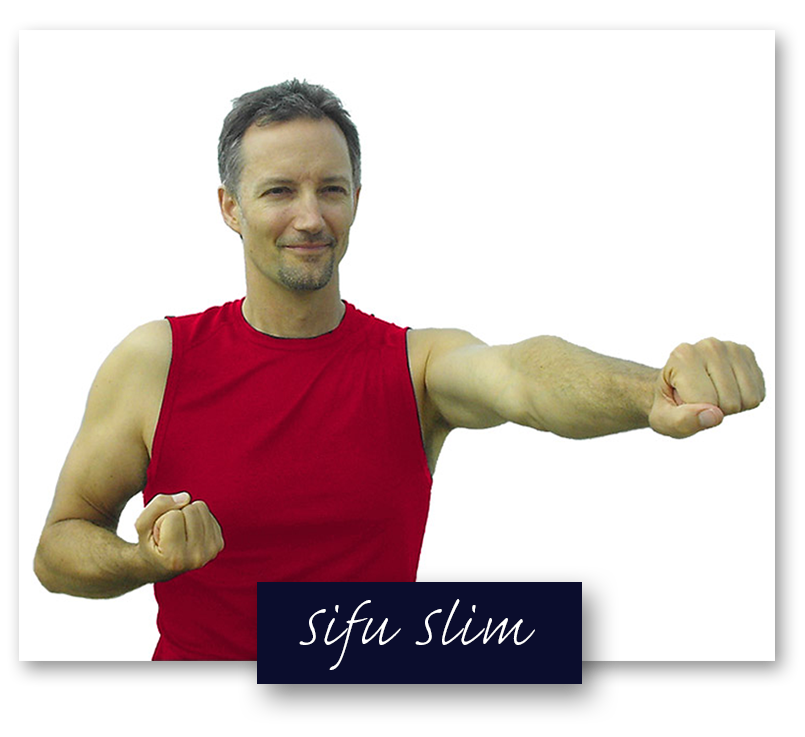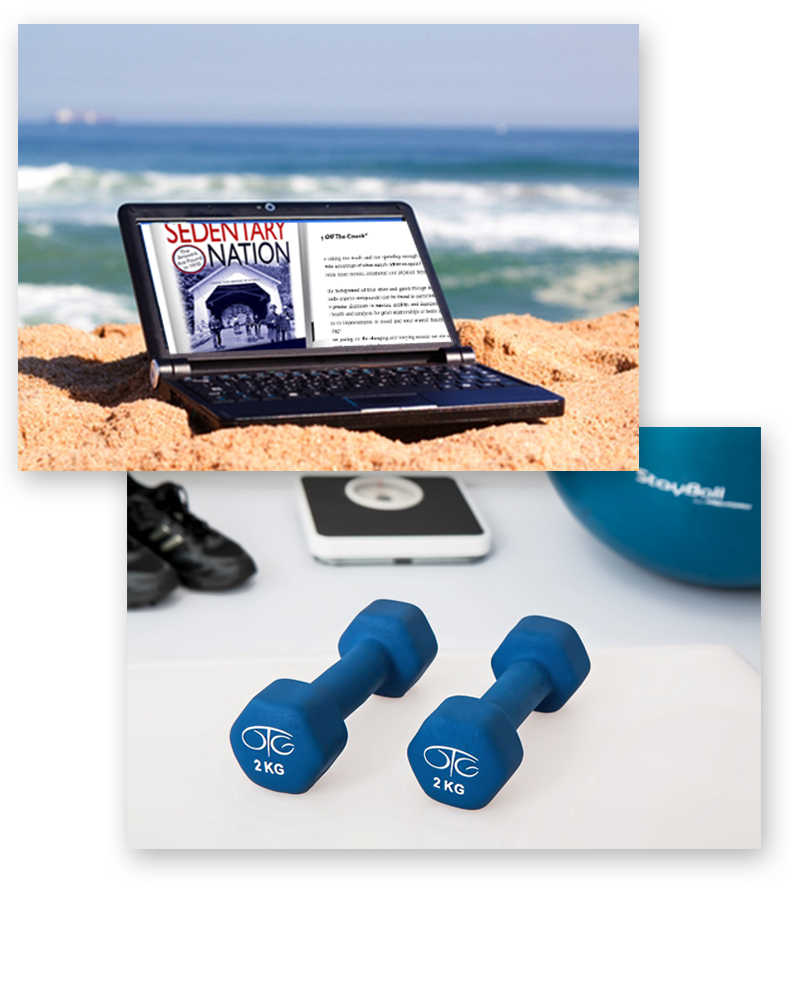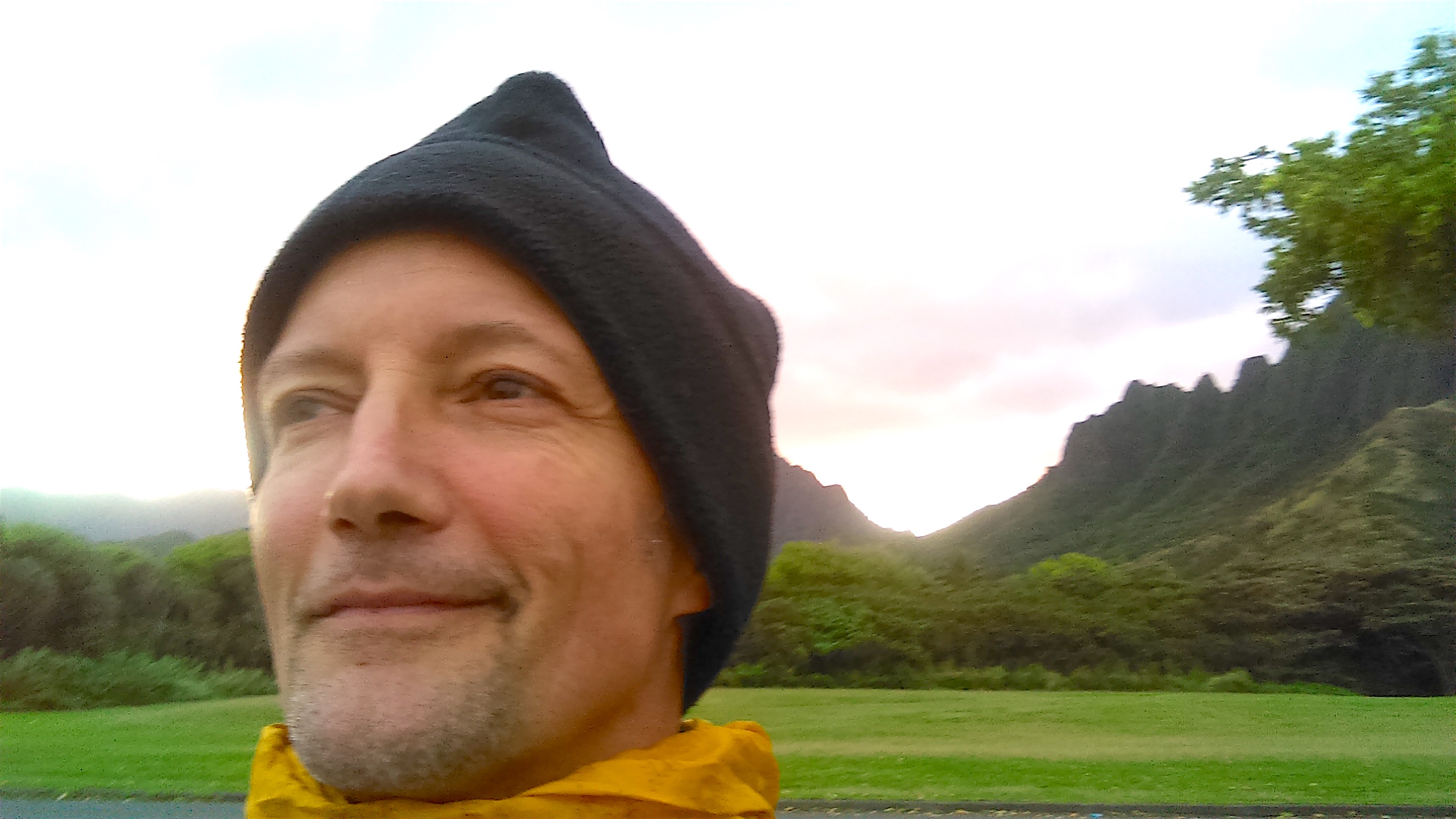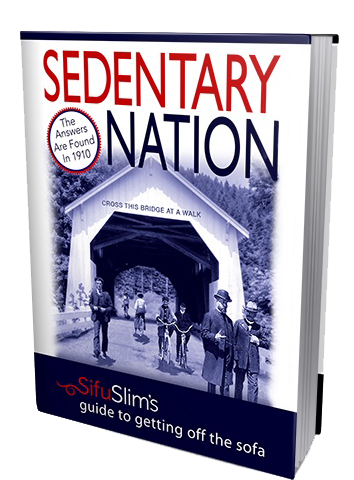The Answers are Not Found in the New Millennium, They're in 1910
Sifu Slim's Guide to Getting Off the Sofa
About the Book

“Sedentary Nation” recalls pivotal moments of the history of physical movement.
Despite modernism and the decreasing use of the physical body, the book shows how almost anyone can easily benefit from a program that has a payoff of improved health, youthful look and energy, better sleep, and clearer thinking without the physical toll and battle fatigue that often accompany other approaches to wellbeing and fitness.
Expanding on that, the author details how, as Chinese philosophy explains, you can change your thinking and the body will follow.
By sharing knowledge and practices from those he respects the most and cites throughout the book, including Jack LaLanne and Bruce Lee, Sifu Slim describes his own journey of self-mastery.
“Sedentary Nation” is the result of several hundred interviews and over a decade of research.
It stands as both wellness guide for the busy, modern era and humorous memoir of a life spent living the wellness walk.
Ten things you will learn in Sedentary Nation
1. New Studies, Always New Studies
Have you “had it” with the latest studies? You’re already on information overload anyway. Most studies are produced by a giant industry that seems to flourish the unhealthier we become. Our ancestors didn’t need a new study to teach them that physical movement meant health and wealth. Few of the practical answers come from the overabundance of health and diet research studies. In fact, for about 6 million years, no one needed them. Wisdom got handed down. Has any “latest study” reduced the downward spiral of our unhealthful, sedentary lives? If you looked at the two piles of research on the science of medicine and wellness, pre-1970’s would look like a two-story duplex while the post-1970’s pile would climb higher than Jack’s beanstalk. If I ever get around to writing a book on that, I may call it The Tale of The Duplex and The Beanstalk. The problem is people will want to read it sitting on their couches. Better they spend more time off the couch.
2. Hunter-Gatherers knew what worked.
For about 6 million years, upright walking hominines moved their bodies in meaningful ways. The hunter-gatherers knew that movement brought food and joy. Be stress free, adopt the way of the hunter-gatherers–move.
3. Wisdom of the ages.
Your ancestors are laughing at lots of you. They can’t believe you have accepted to live in sedentary positions when movement is so invigorating and keeps us looking our sexy best. Wellness comes from the proper mindset, daily activity, good food, and good rest. When’s the last time you listened to the wisdom of your ancestors?.
4. Wellness is not a drop-in class.
Why do so many think they can move or not move depending on their mood of the day? Movement sets everything up to function. The early-bird special is the best deal. Get some movement and fitness out of the way before the day of busyness begins.
5. Maintenance is how we care for our property.
Our bodies and minds are our most valuable property. Care for them as well as you care for your pets, car, and home.
6. Wellness is not a separate part of the day.
Wellness is a lifestyle. The history of humankind reveals a physical and dietary program that was rarely a separate part of the day. It was an integral part. That’s the philosophy that kept human types fit and well for millions of years before we became desk, couch, and car potatoes, and agreed to the supersizing of our food and drinks. People used to eat food from nature, not man-made concoctions from boxes, bags, and cans.
7. Our ancestors weren’t ‘wired’.
Our ancestors may have been exhausted at times but they were rarely ‘wired’ like so many of us are after long days in the digital world. They didn’t need pills to go to sleep; their tired bodies told them to head to bed within a few hours after dinner. They weren’t flipping channels or surfing the Net until late at night.
8. Stress is a modern pandemic.
It’s not because life is tougher these days than at other points in history. A big part of it is our inability to sleep properly. Proper sleep reduces stress and indigestion. Insufficient, excessive, or unsound sleep causes a myriad of problems including nervous tension and depression. Improper diet and exercise negatively impact our sleep patterns. Did you know that counseling centers at modern universities have reported lines of students waiting for psychological appointments? Did you know that today, many students are wired and sedentary? Is all that worth it for uncertain job prospects? No matter what you think about the future, fitness is still free and is a great curative and restorative.
9. The Post Industrial Revolution Breakdown.
Since the advent of the post-Industrial Revolution service economy, we have continued to prepare ourselves for breakdown. We are getting ahead to get behind, and getting much bigger behinds. The mid-20th century parents were the first large group of humans to witness how the evolution of the human species started to degrade for the first time in history. They saw it happening to their offspring, and to themselves. What do you call it? Couch potato syndrome? Desk potato disorder? Car potato calamity? How about just ‘chosen sedentism’?
10. Overworked and Under Recreated.
Sedentism has little to do with distaste of exercise or lack of athleticism. More often it’s the result of being overworked and under-recreated. Many simply suffer an addiction to an immobile lifestyle that comes from a broken pattern and a flawed mindset, two things that gain power until the human organism’s entire wellness system collapses. There are so many rapid-paced personal improvement programs. Mine is different in that I offer a simple, step-by-step program for busy people with highly-programmed lives: Fitness and wellness with no gym required and a natural chemical euphoria with no side effects.FOREWORD
“A Psychiatrist’s Prescription for Getting Off The Couch”
We humans need to get moving, preferably outside, for optimal health. Our workouts done outdoors may provide more mental, emotional and physical benefits than those we do indoors. Even the color green, which is abundantly found in nature, may improve both mood and self-esteem.
Getting physical outdoors amidst the fresh air, sunshine, breeze, and negative ions found in nature against the background of blue skies and green foliage boosts mental and emotional wellbeing. When you’re indoors, keep well ventilated. Cancer causing gases like formaldehyde and other VOCs (volatile organic compounds) can be found in particleboard furniture and carpets. Spending time outdoors, whether exercising, recreating, or even caring for the lawn and garden, has been linked to greater decreases in tension, anxiety, and depression. More benefits include improved levels of calmness, mental clarity, focus, vitality, and enthusiasm. Don’t those sound like prescriptions for health and catalysts for great relationships at home and at work?
In addition, the benefit of increased vitamin D levels as a result of direct exposure to sunlight also contributes to improvements in mood and total overall health. Except for pollution, nuclear fallout, and other hazards, the research certainly isn’t telling us to spend more time indoors. Aren’t we listening?
I tell my patients that simple things, natural things, can provide wonderful health benefits. Focusing and even just gazing on the changing and varying terrain we see while we’re outdoors has been found to stimulate our mind and senses. In an era where people complain of being bored and overwrought with repetition, who doesn’t want more stimulation and a varying terrain?
Recreating and working out of doors has also been found to lower levels of cortisol (the body’s stress hormone) to a greater degree than the same activities done indoors. This isn’t to say we should avoid fitness centers and indoor yoga and martial arts centers, but that the outdoors needs to be where we spend at least some of our time. It’s not a bad idea to spend some quality time outdoors every day. Even my grandparents knew this.
By experience, by passed down wisdom, and by positive results, my grandparents knew that it was healthful and joyful to walk to church on Sunday and go for walks after big meals. As immigrants who left their homeland in Italy, they loved getting out of the house and walking their adopted neighborhood in Chicago. They lived through the Depression and some very tough times. They knew enough to take care of their health and wellness. They understood that putting one foot in front of the other enhanced that and gave them a free activity to enjoy. Don’t you have some lessons from your ancestors you can draw upon?
My grandparents even ate well. I can’t tell you how much I longed for the big family meals that my grandmother and my mother cooked. Being Italian, the meals that bring the fondest memories were the pasta dishes. It always lifted my spirits and I somehow felt my grandmother’s and mother’s love more acutely as they lovingly prepared my favorite dish—spaghetti and meatballs. Being young and having a high metabolism, I didn’t have to worry about carbs back then.
Naturally for my era, those meals were typically followed by some physical movement. I would head outside and eventually locate my friends and we’d be choosing teams for another game of football, baseball, or pickle. Growing up, I would often take a walk with my dad after dinner and I was always active with baseball, wrestling, weight training, and martial arts. Later, in the overly sedentary world that was medical school, I did my utmost to keep moving. After studying for hours on end, I would clear my mind by going out in nature for a walk which helped to recharge my batteries and get me ready for another round of studying.
I regularly advise patients to take up walking to relieve stress and improve digestion. When we were young kids, our elders took us for frequent walks. That was a great way for both of us to spend some recreational time. Besides the benefits to the mind and the heart, the digestive processes are often enhanced when we don’t just sit down on the couch right after a meal. Even our stomachs seem to like it when we stroll the sidewalks and paths. And, to help us through our busy schedules and daily challenges, this good digestive health and physical activity is associated with better sleep, often considered the best stress reliever of all. ...
Gary Casaccio,
M.D., Psychiatrist and Fitness Enthusiast
Wheaton, Illinois
M.D., Psychiatrist and Fitness Enthusiast
Wheaton, Illinois
Table of Contents
1Chapter 1 Lifestyle in 1910 vs New Millenium
2 As Dentatured as our Oatmeal
3 Readers' Comments and the Timeline of Decreasing Physical Movement
4 A Survival Guide for the Sedentary World
5 Recreation and Physical Activity; Photo Section
6 Movement and the Hunter-Gatherers
7 Downtime
8 The Sifu Slim Program for Daily Living
"Sedentary Nation" recalls pivotal moments of the history of physical movement. Despite modernism and the decreasing use of the physical body, the book shows how almost anyone can easily benefit from a program that has a payoff of improved health, youthful look and energy, better sleep, and clearer thinking without the physical toll and battle fatigue that often accompany other approaches to wellbeing and fitness.

About Sifu Slim
Sifu Slim (pron. See Foo) is the pen name of Henry Kreuter, M.A., NSCA-CPT, an author, wellness educator/speaker, lifelong amateur athlete, and leading proponent of “intentional physical activity.”
As a writer, Sifu is an expert on sedentary living. His program of maintenance fitness, proper diet, and downtime is the perfect antidote for the sedentary, over programmed world..

Sign up
to get the latest news
More Material
This book highlights the mindset you need in order to survive, thrive and get natural daily euphoria. All done without going to a gym. It’s about the mind-body connection one enjoys by doing daily fitness and wellness activities: and the payoff, you will look better and feel better. What makes this book different is how the author traces the history of sedentism and compares hunter-gatherers to modern couch, desk, and car potatoes who have fallen pray to pain-masking drugs and have made stress related drugs the seven top-selling drugs on the market.



